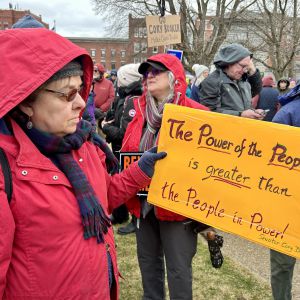City council approves grant for new Community Justice Center plan

GEOFF FORESTER—Monitor staff
|
Published: 07-10-2024 9:54 AM
Modified: 07-11-2024 9:44 AM |
A new Community Justice Center could house legal resources in Concord, with New Hampshire Legal Assistance, 603 Legal Aid and the Disability Rights Center looking to combine forces in one office space.
Currently, the three providers have their own office spaces downtown but the shared space would create a “hub for civil legal services.”
While Concord City Council approved a $25,000 Community Development Block Grant that will allow the firms to hire architects to develop a site plan, assess potential locations and provide a cost estimate, councilors still raised concerns over tax-exempt property in the city.
“I have a lot of concern about what is going on with what I’ll call the cannibalization of our commercial property,” said Fred Keach, an at-large councilor.
With vacant commercial property downtown and many tax-exempt nonprofits and government buildings, Keach fears that the pressure will be on residential property to generate tax revenue for the city. With a city-wide revaluation, this will become apparent, he said.
“Suddenly residential property is valued much higher than commercial property and there’s going to be a massive shift and it’s going to surprise lots of people,” he said. “These are all great organizations, I don’t mean to disparage any of them but the amount of nonprofit property we have in the city is a problem.”
If the legal center wanted to earn tax-exempt status for housing the three nonprofits, they would apply annually with local and state assessing departments, according to Timothy Thompson, the city’s assistant director of community development.
To Nathan Fennessey, an at-large councilor, the concerns about nonprofits and commercial property in the city are valid, but the work of these legal services to support people, especially with housing disputes, is essential.
Article continues after...
Yesterday's Most Read Articles
 After four decades collecting carts, Ricky Tewksbury will retire when Shaw’s closes mid-April
After four decades collecting carts, Ricky Tewksbury will retire when Shaw’s closes mid-April
 Written shooting threat sends Concord High students home early
Written shooting threat sends Concord High students home early
 ‘It’s everything’: In largest rally yet, Trump protestors descend on Concord
‘It’s everything’: In largest rally yet, Trump protestors descend on Concord
 DHS email error causes stress, anxiety for New Hampshire's Ukrainian community
DHS email error causes stress, anxiety for New Hampshire's Ukrainian community
 ‘There was no oversight’: NH child advocate has been a watchdog for children's care. Now, the office is on the chopping block
‘There was no oversight’: NH child advocate has been a watchdog for children's care. Now, the office is on the chopping block
By supporting a new law center, new vacancies will emerge in each of the organization’s old buildings. The city can then fill these properties with entities that will contribute the tax base, he said.
Housing the three firms in one building would allow for clients to better access services and for each organization to reduce their costs and serve more people, the applicants wrote in their community development block grant application.
Clients for all three firms are low-income, people with disabilities and older adults who are seeking help for anything from housing to domestic violence disputes.
Often, they work in partnership with each other and one center for all three firms will only strengthen this work, said Sarah Mattson Dustin, Executive Director of New Hampshire Legal Assistance.
“We collaborate carefully and intensively to make sure people can connect with the civil legal help they need as easily as possible,” she said in a statement. “We are grateful to the City Council for approving this planning study grant to allow us to investigate this idea further.”
Consolidating these resources will better assist people looking for assistance, said Jennifer Kretovic, the Ward 3 councilor.
“When we look at the most vulnerable populations in our community we are looking at people that need to go from one resource to another resource to another resource to another resource,” she said. “Combining these three legal focused organizations takes away one really significant barrier for somebody that has significant challenges.”
The initial $25,000 community development grant will aid the organizations with initial planning as they prepare to apply for another public facility block grant next year, according to the grant request to city council.
The center will be funded through private and public partnerships with an initial estimate of $4 to $6 million in project costs.
As the city continues to look at solutions to homelessness in Concord, the council should continue to assist places like the Disability Rights Center, that help house individuals in the area, said Judith Kurtz, an at-large councilor.
“The greatest way to combat homelessness is to keep people in homes,” she said. “So supporting organizations locally that help individuals to fund housing and remain in housing when barriers arise, to me is a good use of city space.”
Stacey Brown, Ward 5 councilor, suggested asking the organizations for a breakdown of how many local clients they serve.
To Kris Schultz, Ward 9 Councilor, the number of nonprofits in the city comes with Concord’s position as the state capital. Mayor Byron Champlin would agree.
“I appreciate sincerely the contribution that nonprofits make to our community both in terms of the services that they provide, the employment that they provide and the richness that they add to our community,” he said.
That’s not to say he’s not concerned about property values in the city, though.
“I also have an eye towards trying to protect the individual property taxpayer, the homeowner,” he said. “We have the highest percent of property that is untaxed because it’s owned by nonprofits or the state of any community, any municipality in the state.”







 Henniker ponders what is a ‘need’ and what is a ‘want’
Henniker ponders what is a ‘need’ and what is a ‘want’ Boscawen residents vote to fund major renovation of public works building
Boscawen residents vote to fund major renovation of public works building ‘Voting our wallets’: Loudon residents vote overwhelmingly against $1.7M bond for new fire truck
‘Voting our wallets’: Loudon residents vote overwhelmingly against $1.7M bond for new fire truck In Pembroke, Education Freedom Accounts draw debate, voters pass budget
In Pembroke, Education Freedom Accounts draw debate, voters pass budget
